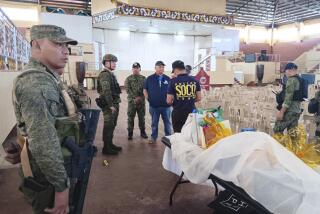Bomb May Have Been Meant for Aquino
- Share via
MANILA — Military experts investigating Wednesday’s explosion of a bomb that left four dead and dozens injured at the Philippine Military Academy said Thursday that the bomb was a radio-controlled device that may have been meant for President Corazon Aquino.
Senior military authorities said that disgruntled soldiers may have placed the bomb in the roof of a grandstand directly above the spot where President Aquino is scheduled to address graduating cadets on Sunday.
The experts said the device may have been triggered prematurely by a random radio transmission.
Gen. Fidel V. Ramos, the armed forces chief of staff, and Defense Minister Rafael Ileto both blamed Communist rebels for the blast. They told reporters that the incident was “an act of terrorism” that justified an all-out military offensive against the insurgents.
Investigators who have been sifting through the wreckage said the explosive device consisted of three Soviet-made anti-tank weapons known as B-40s.
Set Off by Radio Signal
Authorities said Wednesday’s bomb had not been triggered by a timing device, as first reported by the military, but by a radio signal. This led the investigators to speculate that the bomb was to have been set off during Aquino’s Sunday speech.
An officer at the scene of the investigation, who asked not to be identified by name, said that a small private aircraft passed over the grandstand at the moment the bomb went off. A rehearsal of the graduation ceremony was in progress, he said, and dozens of security men were present and using walkie-talkies.
Investigators said that a radio signal from the plane or from any of the walkie-talkies might have detonated the bomb.
Brig. Gen. Jesus de la Cruz, the regional military commander in charge of the investigation, told reporters that his men were looking into “many angles, including this terrorist business.” He said it was likely that the bomb had been meant for the president because it “was placed right above the podium where any guest of honor will deliver a speech.”
Familiar With Grandstand
Based on a preliminary investigation, De la Cruz said, those responsible for the bombing had detailed knowledge of the grandstand’s design and its electrical system, leading to speculation that the bomb was placed by military personnel.
De la Cruz confirmed that he and his investigators suspect “disgruntled personnel, whether soldiers or civilians.” He said it was not clear when the device had been planted.
Aquino saw the charred, twisted wreckage of the grandstand Wednesday and then visited three hospitals to which the wounded were taken in the northern resort city of Baguio, where the academy is located. Later she visited the funeral home where the dead were taken, stopping to pray at the coffins of the three soldiers and one civilian.
Aquino, who has survived at least four attempts by dissident military factions to destabilize her government since she took power a year ago, seemed shaken as she visited the wounded.
Col. Lisandro Abadia, one of the injured soldiers, told reporters that he suspected the Communist rebels of the bombing “because I cannot imagine our own kind setting up that kind of thing, knowing fully that scores will be injured.”
The president said nothing to reporters. But the presidential spokesman, Teodoro Benigno, said that her chief of security, Col. Voltaire Gasmin, told him that if the bomb had not gone off, his explosives experts would have found it during their routine search of the site.
3 Groups Capable of Bombing
Benigno said that military authorities told him three groups “were capable” of the bombing, but he refused to identify them.
Gen. De la Cruz said later that among the suspects are members of military factions still loyal to former President Ferdinand E. Marcos, who was driven into exile in February of last year.
Several generals and colonels identified with Marcos have attempted to overthrow Aquino. The military has identified the dissidents and issued arrest warrants for them, but none has been jailed.
In a strong editorial Thursday morning, the Manila Chronicle raised the possibility that military dissidents were behind the bombing.
“It may be true,” the Chronicle said, “that whatever influence and armed support these plotters had have already been greatly diminished by the successive failures and by the massive display of public support for the Aquino leadership.
“But the threat of another try, or at least the threat of terror bombings to create political instability, is still there, if only because the plotters and their supporters are still on the loose.”
Returning Fugitive Seized
In what may have been a related development, security officials arrested Orlando Dulay, a former colonel who in the Marcos years maintained a large personal army. He was seized in Manila as he arrived from Los Angeles, carrying a false passport and wearing a wig.
Dulay is wanted in the Philippines on multiple murder charges in connection with the killing of opposition political workers in the campaign for last year’s presidential election.
U.S. authorities had known of Dulay’s presence in the United States since soon after his escape from prison here a year ago.
More to Read
Sign up for Essential California
The most important California stories and recommendations in your inbox every morning.
You may occasionally receive promotional content from the Los Angeles Times.










